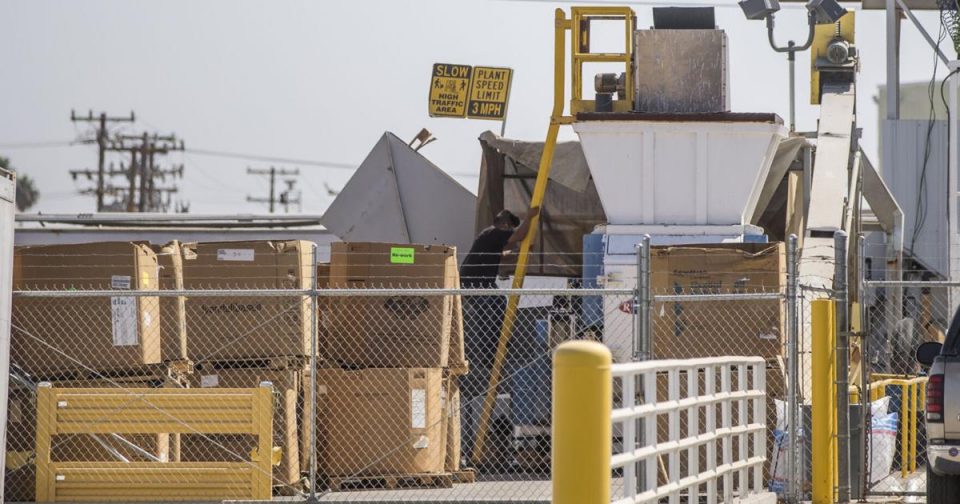Hazardous materials cleanup work is expected to begin later this year at a plastics recycling operation next to Meadows Field Airport that state regulators worry may have contaminated the area’s soil, surface water and groundwater with lead, sulfuric acid, hydrocarbons and volatile organic compounds.
Troy, Ala.-based KW Plastics of California at 1861 Sunnyside Court in Oildale is preparing a revised work plan that will be presented for public comments after a review by the California Environmental Protection Agency’s Department of Toxic Substances Control. DTSC estimates the cleanup will begin in November.
KW has a history of permitting problems at the 17-acre site used primarily to turn plastics into pellets for the manufacture of products such as paint cans. Its pellets have also been used to make battery cases, glove box liners and nursery trays for plants.
First opened in 1986, and initially permitted for hazardous waste management in 1994, KW told the state it would stop handling hazardous materials at the site in 2019. That’s the year DTSC sued the company alleging it was taking in polypropylene chips contaminated with lead and corrosive acid from a battery recycling plant in Vernon.
As stipulated by the suit’s final judgment in late 2019, the company may no longer handle hazardous waste at the site, with certain exceptions. KW also agreed to pay $610,000 in civil penalties and $50,000 for DTSC’s corrective oversight.
KW’s corporate manager of environmental affairs, Roy Baggett, said Wednesday the company continues to recycle plastic at the facility but that it has stopped taking in materials judged hazardous by the state.
“We’re just closing up part of the operation,” Baggett said. “We decided it’s just not worthwhile to continue that.”
He said the property had been contaminated with lead from airplane fuel prior to the company’s arrival at the site, adding, “We’re not the main contributor to the issue.”
Cleaning up the property won’t be expensive or cause many job losses, he said, and any contaminated material headed to an approved landfill probably won’t amount to more than 10 truckloads.
The DTSC said by email Friday the company is preparing a report on results from a four-month, site-wide investigation that concluded in July. The work involved collecting soil samples and testing them for lead, VOCs, semi-volatile organic carbons and total petroleum hydrocarbons.
The DTSC will review the plan for compliance with state and federal regulations, as well as the court order. The cleanup proposal is to be posted publicly and comments will be gathered for 30 days.
In a letter sent last month to members of the local community, the agency cited suspicions of contamination near KC’s operations building, on vacant land nearby, in a terminal drainage basin and on a small part of the airport. It added that tractor trailers used to transport battery cases had been parked in vacant parts of the site and, in some cases, contaminated the soil below.
The airport’s director could not be reached for comment.
KW was allowed by the state to process waste containing lead in 1994, having already done so for five years before, according to the DTSC lawsuit. The company was not authorized to handle corrosive materials, nor was it permitted to compress hazardous waste with a baler or dry in on racks, as the suit alleged was happening on the property.
A separate but related criminal case against Alabama-based Wiley Sanders Truck Lines Inc., whose late founder co-owned KW’s parent company, resulted in a guilty plea to federal charges of knowingly transporting hazardous materials in trucks not equipped for the task.
The suit accused Sanders of operating trucks that leaked liquid with dangerously high lead levels on roads and freeways between the now-defunct Exide battery plant in Vernon, in Los Angeles County, to KW in Bakersfield, where the waste was rinsed and converted to pellets.
DTSC records and correspondence with KW trace the cleanup order to a dispute over a corrective action enforcement order the agency issued to the company in 2016.
That year, a state site inspection raised concerns hazardous material at the site may have been released into the environment. The records say the area’s drainage basin may have been contaminated and noted several groundwater wells within a mile of facility may have been affected.
The company was ordered to evaluate data and abate immediate threats while preparing a long-term action plan for approval by the DTSC. The effort was to include a current conditions report, work plans and an analysis of how quickly the contamination may be spreading, and in what direction.
Reports KW sent in response to the order on April 30, 2020, were deemed incomplete by DTSC. The agency then determined a second draft of the reports sent in August of that year left out information that should have been included. A third draft was not available, and the state said the company is still working on its proposed cleanup plan.


